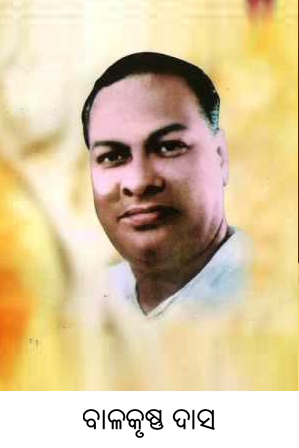Sangeetsudhakar Balakrushna Das
Died :- 11-Nov-1993
Place of Birth :- Basantapedi, Puri

Sangeet-Sudhakar Balakrushna Das, well-known Odissi musicologist and vocalist, and renowned Odissi music guru was born on May 21, 1923 in the village of Basantapedi near Balkati in Puri district. His father, Dinbandhu Das, was a lover of music, and his mother was Kamala Devi. Father Deenbandhu sometimes played the violin and recited Sanskrit verses in a beautiful manner which had a profound effect on Balakrushna as a child.
During the school prayers, the music teacher was fascinated by the sweet nuances of his singing. On his advice Dinabandhu sent him to a gotipua guru for education in vocal music. Later, he was admitted in a Sanskrit school in Bhubaneswar to study the classical language. There, too, his singing talent surprised many. He became a disciple of Gokul Srichandan in Cuttack to learn formal songs. His special talents flourished in Odissi, chhanda, bhajan and janan. The guru advised Balakrushna to learn Hindustani music along with traditional music. Kshitish Chandra Moitra, the guru in Hindustani music, taught him the ins and outs of this classical form. But Balakrishna had to leave Odisha to learn more. He had the opportunity to become a favourite of reputed musicians like Raichand Baral, a renowned pianist and music director from Calcutta, and later Bade Ghulam Ali Khan. His closeness to Ghulam Ali further turned the magical talent of Balkrushna into a marvel. His mastery over the unique art of Hindustani music inspired him to make Odia traditional music more catchy and effective with a new colour.
Balakrushna Dash started his music career as a singer of Odissi, Bhajan and Chhandas at AIR, Calcutta in the year 1944. After four years, when the AIR Cuttack centre was inaugurated in 1948, he left there and joined in the music department of the Cuttack centre as a regular artist. He had straightway refused offers from Calcutta and Bombay. During his stay in Calcutta, the undeniable influence of Bengali films and Bengali music did not deter him from the Odissi, chhanda, champu, bhajans and janans. He maintained his Odia exclusivity, and never inveigled himself into the Bengali wave.
At various points of time in his life he was associated with many institutions. In addition to Akashvani, Balakrushna was associated with the Cuttack Kala Bikash Kendra (1950-60), the National Music Association (1950-55) as also with the Utkal Sangeet Samaj. He was the Head of the Odissi Music Department at the Utkal Sangeet Mahavidyalaya from 1970 to 1984. It would be wrong to say that Balakrushna had confined himself to institutions; rather it could be more aptly said that he himself had become an institution. Medieval Odia music was predominantly rhythmic and almost identical to the music in other parts of India. But in his style of singing, Balakrushna had identified this music and himself with the mutts, temples, rehearsal centres, village chaupadhis, ballad singing groups and the laymen of rural areas. He rendered his native music in a wonderful way in his sophisticated style of singing while fusing it with chhandas and champus. He coordinated composition of music with Odissi dance. Padma Shri Shyamamani Devi and Guru Ramhari Das were the illustrious ones among his hundreds of disciples. He was a naturally gifted prodigy with deep grounding in classical music. His early initiation into music in a place like Calcutta had exposed him to different styles and penchants in singing, composition and finer elements like orchestration.
Balakrushna Das was a veteran Guru of Odissi music. He has directed music in at least 20 films and hundreds of non-film albums including Odissi, Drama, Theatre and music programmes for the AIR, Cuttack. His first film as a music director was Kedar Gouri in 1954. The film Srikrishna Rasalila (Basant Rasa) has become a symbol of Odia identity in the international arena. He was honoured with the Odisha Sangeet Natak Akademi Award for Odissi Vocal for the year 1975-76. He worked as an Odissi classical music teacher at the Odissi Research Centre under the state government's culture department.
Sangeeta Sudhakara Balakrushna Dash defied the norm that urbanites mainly compose modern music.
Balakrushna Das was awarded various titles by various institutions such as Sangeet Sudhakar, Sangeet Shiromani, Sangeet Ratna, Swarsinghari and many more. He has been awarded and honoured by many cultural institutions including Odisha Sangeet Natak Akademi (1976), Odisha Sahitya Akademi (1982), Kendra Sangeet Natak Akademi (1985), IMFA Charitable Trust (1985), Kalabikash Kendra (1986) and Department of Culture, Govt. of Odisha (Jayadev Award: 1987).
From a humble background Balakrushna Das reached the heights in Odia music in all forms – filmy and non-filmy. It would not be an exaggeration to say that he is one of the few legendary figures in the arena of Odissi music.
Books
Story
Copyright © 2024 Odia Virtual Academy. All rights reserved Total Visitors- 1
Powered by: Odia Virtual Academy

